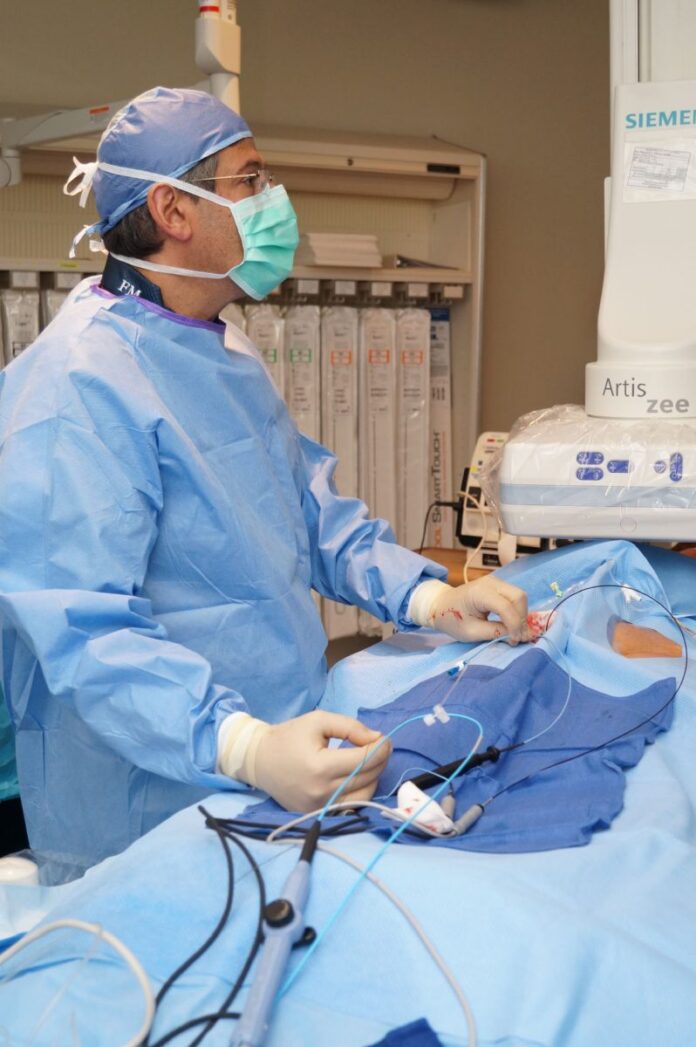HARLINGEN – Cardiac patients say it feels like their heart is banging against their chest. They feel light-headed, weak, nauseated, as if they are gasping for air. Others say they had no symptoms at all, but, discovered an abnormal heartbeat during an annual physical.
These patients are describing Atrial Fibrillation, also known as AFib or AF. It is the most common heart rhythm abnormality in both adult men and women. And, while it is not commonly fatal, Atrial Fibrillation doubles the risk of heart-related deaths and more than doubles the risk of a stroke.
Atrial Fibrillation was a topic of discussion in Wednesday’s Harlingen Medical Center Doc Talk Lecture presented by Dr. Frank Mazzola, Cardiac Electrophysiologist and Cardiac Electrophysiology Laboratory Director at Harlingen Medical Center.
“An abnormal heart rhythm can occur when an area of heart tissue fires abnormally, or when there is a short circuit, which allows electrical impulses in the heart to follow abnormal paths,” said Dr. Mazzola. “Both of these can cause the heart to beat very rapidly, and may cause severe dizziness, shortness of breath or fainting.”
Atrial Fibrillation is defined as a “quivering” or “irregular heartbeat,” also known as arrhythmia. If left untreated, experts agree that it may lead to more serious complications such as the development of a blood clot, stroke, heart failure, or other related heart issues.
The heart contracts and relaxes to a regular beat, normally, said Dr. Mazzola.
But, when a patient suffers from Atrial Fibrillation, the upper chambers of the heart, known as the atria, beat irregularly instead of beating normally to move blood into the ventricles. People who have strokes have often been diagnosed with this heart arrhythmia.
According to the American Heart Association, it is estimated that more than 2-million Americans suffer from AFib, but they may not even be aware of it.
Dr. Mazzola said it is important that patients be diagnosed and treated properly in order to effectively address Atrial Fibrillation. Treatment which he is offering at the Cardiac Electrophysiology Laboratory at Harlingen Medical Center. As one of the first Cardio Electrophysiologists in the Rio Grande Valley, Dr. Mazzola is performing complex ablation procedures.
Catheter ablation heart procedures are performed find and eliminate the source of an abnormal heart rhythm, without the need for surgery.
Dr. Mazzola said that during this procedure, a small catheter is inserted through the groin and threaded through the veins to reach the heart.
A 3D map of the heart’s geometry is created and electrical information is superimposed as different colors.
Radiofrequency energy is then delivered to the abnormal tissue to eliminate its ability to begin or conduct an abnormal rhythm, and the arrhythmia is cured.
The cardiac ablation procedure is considered a generally safe procedure and is not associated with a significant risk.
The Harlingen Medical Center Doc Talk Lectures, related to heart education, continue next Wednesday, February 24th, which will feature Dr. Juan Villarreal, a Harlingen Dentist and Partner-In-Care to Harlingen Medical Center. His lecture will make the connection between a healthy mouth and a healthy heart, including how a dental appliance can help prevent sleep apnea.
About the Cardiovascular Center
The Cardiovascular Center at Harlingen Medical Center is paving the way for progressive treatment of patients from across South Texas, and beyond. We specialize in the diagnosis and treatment of cardiovascular disease.
Our top-ranked heart team provides minimally-invasive diagnostic testing and treatment, as well as advanced cardiac and vascular interventions, such as angioplasty, stenting, cardiac ablation, open heart surgery, minimally invasive heart valve repair and replacement, and coronary artery bypass graft.
To learn more about this program and Harlingen Medical Center, log on to our website at www.harlingenmedicalcenter.com.





